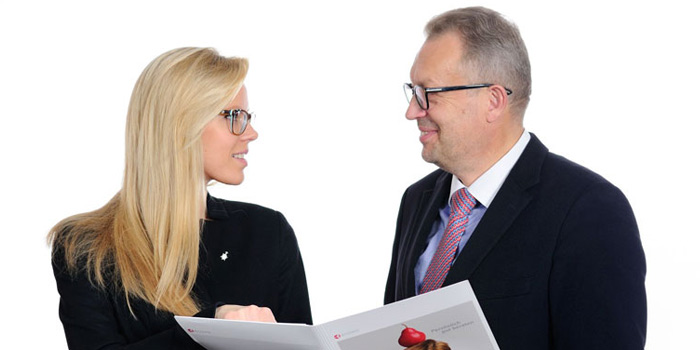
Positive signals, but financial hurdles too
Berlin, 14. August 2015 – What challenges do company founders face? To what extent does the state offer them financial support – especially in the form of credit accommodation or tax breaks? Ecovis addressed this question to its international partners. Ecovis offices in 23 countries participated in the survey, from Uruguay to New Zealand and Japan. The good news, in the words of Alexander Weigert, a member of Ecovis’ board of management, is that “the majority of answers to two key questions about the general entrepreneurial climate were positive.” In other words, in over half (56%) of the countries surveyed it is “easy” or even “very easy” to establish a company, according to the local Ecovis partners (see fig. 1). In 39% of the other countries, the answer was “neutral”. Starting a business was only considered “difficult” in Brazil. The second welcome piece of news was that only in six countries (26%) does a social stigma adhere to failed founders as a general rule, making it difficult for them to be given a second chance. In over half the countries surveyed (57%) they are generally or most of the time given a second chance because (the main reason given) they have demonstrated entrepreneurial courage and gained valuable experience (see fig. 2). In a further three countries (Germany, Ireland and Poland) there is evidence of developments in this direction, facilitated by reforms in insolvency law intended to make it easier to start a new company or reorganise one already founded.
However, a more dismal picture is conjured up by the answers to another question: although the state or other public funding bodies it supports offer credit accommodation in the form of more favourable conditions and/or guarantees (see fig. 3) to medium-sized companies (especially in the case of start-ups) in 16 of the 23 countries surveyed, over half of the Ecovis partner offices in these countries are dissatisfied with the situation. The remainder describes the corresponding assistance offered as no better than “neutral”.
In contrast to many other European countries, Ireland did not have a national business development bank until recently. Towards the end of 2013, when the country left the EU bailout fund, the Irish prime minister, Enda Kenny, and Angela Merkel, the German chancellor, agreed to allow Germany’s business development bank, KfW, to help Ireland to give loans to small and medium-sized enterprises. In order to give them access to long-term loans at favourable rates of interest and with flexible repayment options, the Strategic Banking Corporation of Ireland (SBCI) was established on 31st October, 2014. Besides the KfW, other financial partners of SBCI are the European Investment Bank and the Ireland Strategic Investment Fund to which the assets of the national pension fund were transferred.
Meeting the financing challenge
Another interesting finding is that in 13 of 23 countries participating credit financing is the main source of capital, and equity capital in the remaining ten. “In Brazil we prefer equity capital because the interest on loans is extremely high”, says Claudio Eguchi, a partner in ECOVIS Pemom. “In Ireland, commercial banks will not grant loans until a business has become established on the market”, says David Spicer, Ecovis’ partner in Dublin. “This means that start-ups tend first of all to depend on equity as well as on state subsidies for initial funding, especially in the preparatory stage. We have to wait and see to what extent the SBCI, the new business development bank, can facilitate loan financing to those wishing to establish companies.”
When asked how difficult it is to acquire equity for business start-ups and the further development of a business, the majority (56%) opted for “neutral”. One such reply was given by E.C. Ortiz in Chicago, in the cradle of venture capital, USA. Ecovis co-operates with this firm in the spheres of accounting and taxation. Emilio Martinotti, a partner in Ecovis’ offices in Italy, came to the same conclusion about his country, whilst emphasising that “basically there is no lack of possibilities to find investors and acquire seed capital“, for example from business angels or private equity companies. However, here too, he adds, “It depends on the quality of the formation concept and the business plan as to whether the search for venture capital is successful.”
There are only three countries (Croatia, Liechtenstein and Romania) where Ecovis’ partners deem the acquisition of venture capital “easy”, whilst in twice as many (26%) it is considered “difficult”. In this latter category are such disparate countries as The Netherlands and Poland, Brazil, China, Singapore and New Zealand. The status in Spain, which is still suffering from the economic consequences of the real estate and banking crisis, is currently even rated as “very difficult”.
In the words of Yi Wang, a partner in Ecovis’ office in Shanghai, “It is not easy to raise equity capital from others who don’t know them”, given that, in China, personal contacts play a great role. “However, in one sphere things are starting to change: in recent years more and more high-tech companies have been founded, especially in the internet business.
In this case, there is a chance to acquire outside venture capital”. Israel is one of the leading high-tech countries. “For start-ups in this field it is easier to find creditors”, says Ehud Ozery, Managing Director of Ecovis’ office in Tel Aviv.
The situation in New Zealand is characterised by a limited choice of institutional private equity and a still less developed venture capital market. Instead, the banks are correspondingly more active. “When considering loans to be granted to company founders, they basically concentrate on future cash flow and less on assets offered as security”, says Gareth Hoole, an Ecovis partner in Auckland, New Zealand’s commercial capital. “However, they will require some form of security, usually in the form of a general security interest over all the business assets and normally this will also involve a pledging of private assets or personal guarantees.”
This makes New Zealand one of the great majority (70%) of the countries surveyed in which the banks generally require personal guarantees from the shareholders or partners when issuing loans to limited liability companies or partnerships. “Of course this also depends upon how convincing the business model is, the experience and skills the founders can contribute and to what extent other collateral, for example public guarantees, is available,” says Thomas Budzynski, tax advisor at Ecovis and a Certified Advisor for International Tax Law.
A new financing option
There is quite a new source of financing called crowdfunding. This means that the required capital is collected via an online platform from many private creditors or investors, most of whom participate with relatively small sums. In 16 countries (70%), crowdfunding is seen by the Ecovis partners participating in the survey nowadays as an “accepted form of financing” for start-ups and for small businesses wishing to exploit growth opportunities, for example to present new products. However, “accepted” does not necessarily mean that this financing method already plays an important role, as several commentators pointed out. Nevertheless, the answer “no” could also only be an expression of the fact that it is still early days for this financing instrument.
At any rate, crowdfunding was welcomed with open arms in Great Britain. “It has very quickly filled the gap left by the banks,” says Christopher Jenkins, senior partner at ECOVIS Wingrave Yeats in London. “Although venture capital is difficult to acquire in the Netherlands, there are other possibilities to collect start-up or expansion capital through Dutch or international crowdfunding platforms”, says Marc Lodder, an Ecovis partner in Arnhem.
How the state lends a hand
Besides the financial aid already mentioned (such as interest subsidies, grace periods, i.e. interest-only years, or guarantees), many countries also assist newly established businesses by offering favourable tax treatment. According to those Ecovis partners participating, this is the case in 15 of the 22 countries surveyed.
Taking the Ukraine as an example, here newly established businesses are not required to make any tax prepayments on profits in the fiscal year in which the business is recorded in the companies’ register, but instead have to pay tax on their profit only after having submitted their tax declaration for the year in question. In other words, the tax authorities contribute to conserving the company’s liquidity in the start-up phase.
Bulgaria offers genuine tax exemption in order to entice foreign direct investment in certain industries and to certain regions. If they come under a specific category, newly established businesses are not required to pay any taxes on their profits for a certain period – generally five years. In many cases a reduced tax rate is granted subsequently for a further period. In Singapore, in order to encourage new business setups and benefit small businesses in general, a Start-up Tax Exemption Scheme (SUTE) was introduced to provide qualifying companies with exemption from taxable profits up to S$300,000 (about 200,000 euros) in the first three years of operations.
Of course, newly established firms can also benefit from tax breaks intended for small companies. In China, for example, small firms are granted a reduced tax rate. In Singapore and Australia, investments in real assets made by small and medium-sized enterprises receive more favourable tax treatment. In Germany businesses which do not exceed certain relatively low size thresholds can claim accelerated depreciation for movable assets at a rate over and above that of regular depreciation, and indeed up to a total rate of 20% of the acquisition value or production value, spread over the first five years.
Great Britain is attractive for highly innovative start-ups because of the generous tax incentives offered to ambitious research and development projects (R&D) pursued by small and medium-sized enterprises. In fact, such companies can offset 230% of their relevant R&D expenses, i. e. reduce their taxable profits by a corresponding amount or increase their losses (by carrying them forward or back). Large enterprises can only offset 130%. Only those enterprises which are subject to corporate tax as corporations are entitled to these tax incentives. The standard set to qualify as an eligible R&D project is, moreover, high: its target should be to make substantial scientific and technical progress whilst at the same time being relevant to the business the enterprise is pursuing.
In Austria the hurdles to be overcome to obtain research subsidies are considerably lower: any enterprise liable to taxation can apply for the tax authorities to reimburse it with 10% (12% as of 2016) of its expenses for “research and experimental development” in the prior financial year, tax-free. However, there are certain limits imposed. The research subsidy is limited to 100,000 euros per financial year. It therefore makes a stronger impact on smaller businesses.
Taken as a whole, research and development costs incurred by enterprises generally receive favourable tax treatment in 16 of the 22 countries surveyed (no reply from one country), in one form or another. In most of the countries surveyed, businesses are eligible for state R&D subsidies; however, in some cases these are confined to specific industries, technologies or applications (such as, for example, energy conservation).
(Fig. 1) How easy is it to establish a company?
| answer | number | percent | countries |
| very easy | 6 | 26.1 | Australia, Great Britain, New Zealand, The Netherlands, Ireland, Singapore |
| easy | 7 | 30.4 | Bulgaria, Israel, Italy, Japan, Latvia, Liechtenstein, Romania |
| neutral | 9 | 39.1 | China, Germany, Croatia, Austria, Poland, Spain, Ukraine, Uruguay, USA |
| difficult | 1 | 4.4 | Brazil |
| very difficult | – | 0 |
(Fig. 2) How does society regard founders who have failed?
| answer | number | percent | countries |
| It is regarded as a social stigma so it is difficult for them to be given a second chance. | 6 | 26.1 | Bulgaria, Italy, Japan, The Netherlands, Austria, Spain |
| They deserve a second chance because they have displayed entrepreneurial courage and gained valuable experience. | 9 | 39.1 | China, Israel, Latvia, Liechtenstein, Romania, Singapore, Ukraine, Uruguay, USA |
| It is general felt they deserve a second chance. |
4 | 17.4 | Australia, Brazil*, Great Britain, New Zealand |
| Reforms to insolvency law should make it easier to be given a second chance. | 3 | 13.0 | Germany*, Ireland, Poland |
| other | 1 | 3.4 | Croatia |
* The attitude depends greatly on individual circumstances.
(Fig. 3) How do state bodies and business development banks facilitate the credit financing of medium-sized enterprises?
| answer | number | percent | countries |
| with loans at more favourable conditions (e. g. interest lower than the customary rates, grace periods etc.) | 9 | 39.1 | Brazil, Israel, Liechtenstein, The Netherlands, Poland, Singapore, Uruguay, Ukraine, USA |
| with guarantees for part of the loan | 2 | 8.7 | Great Britain, Romania |
| both | 3 | 13.0 | Austria, Germany, Italy |
| other | 4 | 17.4 | China1), Ireland2), Croatia, Spain3) |
| no state assistance | 4 | 17.4 | Australia, Bulgaria, Japan, New Zealand |
| no answer | 1 | 4.3 | Latvia |
1) Although it is government policy to encourage financial institutions to improve the supply of loans and capital to small and medium-sized enterprises, the situation remains difficult.
2) no state assistance until the SBCI business development bank was established on 31st October, 2014 (see article)
3) There are a few programmes but they are not so successful



